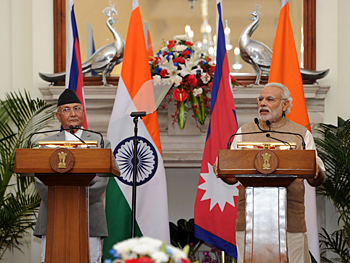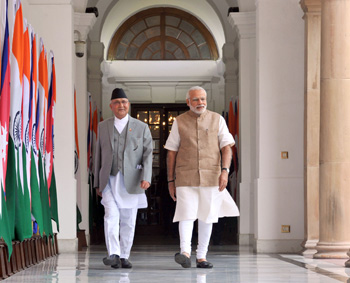INDIAN ARMED FORCES CHIEFS ON
OUR RELENTLESS AND FOCUSED PUBLISHING EFFORTS

SP Guide Publications puts forth a well compiled articulation of issues, pursuits and accomplishments of the Indian Army, over the years

I am confident that SP Guide Publications would continue to inform, inspire and influence.

My compliments to SP Guide Publications for informative and credible reportage on contemporary aerospace issues over the past six decades.
- Interim Defence Budget 2024-25 — An Analysis
- Union Defence budget 2024
- Indian Army: In quest of greater firepower and policy recommendations for gaps
- Indian Army Annual Press Conference 2024
- 6G will transform military-industrial applications
- Tata Boeing Aerospace Delivers 250 AH-64 Apache Fuselages, Manufactured in India
Indo-Nepal Relations – Something going amiss
 |
By Lt. General P.C. Katoch Former Director General of Information Systems, Indian Army
 The Prime Minister, Shri Narendra Modi delivering his statement to the media at the joint media briefing with the Prime Minister of Nepal, Shri K.P. Sharma Oli, at Hyderabad House, in New Delhi on February 20, 2016.  Prime Minister, Shri Narendra Modi with the Prime Minister of Nepal, Shri K.P. Sharma Oli, at Hyderabad House, in New Delhi on February 20, 2016. Before his recent six-day visit to India, Nepal's Prime Minister KP Sharma Oli at one stage had blamed India saying his dream to develop the Himalayan nation as "vibrant" had been shattered by the "embargo imposed by India". That was a time when Nepal was wracked by the Madheshi agitation in Nepal blockading the India-Nepal trade routes for five months because Nepal's new Constitution failed to address Madhesi aspirations in terms of federalism, electoral representation and citizenship, leading to the community enforcing a five-month-long blockade along the India-Nepal border. The agitation had led to Nepal's Parliament passing the first round of constitution amendments (month preceeding Oli's India visit) to enhance Madhesi representation in government bodies on the basis of proportional inclusion and make population the main criteria for drawing up electoral constituencies. This led to lifting of the border blockade in February that eased the shortage of essential goods and commodities in the country. However, the likelihood of another round of protests erupting remained, as many demands of the Madhesis remained unaddressed. During his visit to India, Oli said his main mission was to "clear the misunderstanding" and take ties between the two countries to the same level as in 2014, when Prime Minister Narendra Modi had visited Nepal. Heading a 77-member delegation (including his wife, Deputy Prime Minister and Foreign Minister, Finance Minister, Energy Minister and Home Minister among others) Oli emphasized further saying, "The misunderstanding that persisted in the last few months is no longer there. I believe our relationship will greatly benefit from our discussions. It is high time to look at India-Nepal relations with a forward-looking approach in the interest of the two countries and their people." Oli's visit certainly helped alleviate friendship bonds and appeared from here on it would be smooth sailing. Unfortunately, this was not to be. In a twist of events Nepalese President Bidya Devi Bhandari's scheduled visit to India on May 9 was cancelled, ostensibly on behest of PM Oli. Significantly, Nepal's Ambassador to India Deep Kumar Upadhyaya has been recalled by Nepal after he reportedly spoke to PM Oli about the cancellation of the President's India visit. President Bhandari was to make her maiden visit to India as state guest at the invitation of President Pranab Mukherjee. She was also scheduled to participate in a 'Shahi Snan' in Ujjain's Simhastha Kumbh on May 14. Ambassador Upadhyaya was appointed as Nepal's envoy to India in April 2015. The Kathmandu Post attributes his recall to indulging in anti-government activities, visiting Madhes districts of southern Nepal and having been charged with involvement in toppling the Oli government. Oli's government indeed was under threat because the Prachanda led UPCN-Maoist group had threatened to withdraw support for failing to implement the new Constitution, addressing problems related to Madhesis, expediting the post-quake reconstruction work, checking soaring prices and promoting black marketing and corruption. However, Prachanda called of the threat last minute. It could have been a well orchestrated Chinese move from the background since Prachanda is well known Chinese protégé and Nepalese Maoists were delivered, bred and continue to be supported by China. China follows Sun Tzu's diktat, "Be so subtle that you are invisible. Be so mysterious that you are intangible. Then you will control your rival's fate." The Madhesis agitation is continuing. More Chinese development projects in Nepal in unstable environment could lead to deployment of PLA troops to guard them, as has happened in Gilgit-Baltistan. As it is numerous ongoing development projects and three star hotels in Kathmandu over past several years are manned by Chinese PLA, intelligence and Special Forces disguised as civilians. After India, PM Oli visited China and appears bought over by China through 10 agreements signed between the two countries. Nepal is hosting an international Buddhist conference in Kathmandu from May 19-21, 2016, on the occasion of the 2560th Buddha Jayanti. Prime Minister Modi too has reportedly been invited, as has been Chinese President Xi Jinping and UN Secretary General Ban ki Moon. To soften the genocide unleashed on hapless Tibetans, China wants to establish her Buddhist presence at Lumbini (birthplace of Buddha), the whole game being to undermine the influence of the Dalai Lama. In doing so, China aims to further fracture the Buddhist people. The lethal arming of the Wa tribe based United State Wa Army (USWA) in Myanmar, who are 100% Buddhists is part of the same Chinese plan. In 2012, China unveiled a $3 billion plan for the development of Lumbini, overseen by China's Buddhist Association (CBA), China selected 11th Panchen Lama being Vice President of CBA. The project includes a fully financed and China managed monastery providing free religious instruction for all monks from the region and an airport, with obvious military implications. At the moment China appears to have gripped Nepal by the jugular. India's erstwhile UPA regime is partly to blame for decade long neglect of our immediate neighbours. Recently, there were reports of Ranjit Rae, Indian Ambassador to Nepal being expelled but the Nepalese Government has dismissed these reports.
Photo Credit: PIB |





